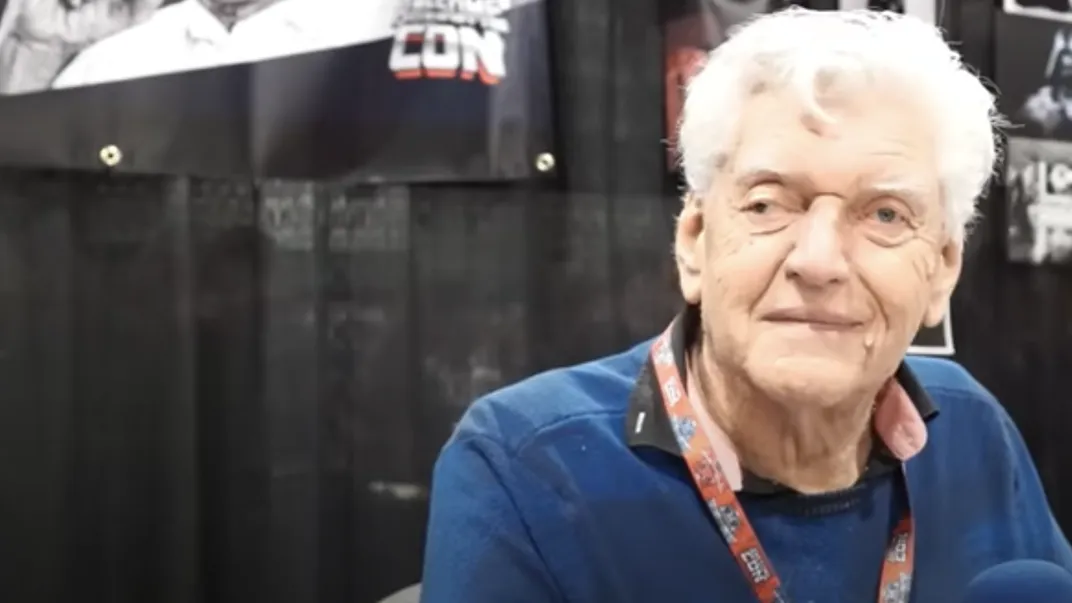Darth Vader Didn’t Come Alive Until James Earl Jones Gave Him a Voice
The prolific American actor, who died on September 9, recorded his dialogue for the first “Star Wars” film in less than three hours
:focal(2500x1690:2501x1691)/https://tf-cmsv2-smithsonianmag-media.s3.amazonaws.com/filer_public/a6/68/a6680183-b472-4a97-9287-af25a9c2a7a4/gettyimages-1306911953.jpg)
With his instantly recognizable black mask and red lightsaber, Darth Vader is one of the most iconic villains in cinema history. But it was his voice—a deep, menacing tone punctuated by labored breathing—that brought the legendary Star Wars character to life.
The man responsible for Darth Vader’s terrifying timbre was American actor James Earl Jones, who died on September 9 at age 93.
“James was an incredible actor, a most unique voice both in art and spirit,” says George Lucas, the filmmaker who created the Star Wars franchise, in a statement. “For nearly half a century, he was Darth Vader, but the secret to it all is he was a beautiful human being. He gave depth, sincerity and meaning to all his roles, amongst the most important being a devoted husband to the late Ceci and dad to Flynn. James will be missed by so many of us … friends and fans alike.”
Today, Darth Vader is one of Jones’ best-known roles. But this wasn’t always the case: At his request, Jones was not credited for the role in the first two films—A New Hope (1977) and The Empire Strikes Back (1980)—until they were re-released as special editions in 1997.
When Jones agreed to lend his voice to Darth Vader, he was already decades into his career as a stage and film actor. However, he didn’t want to attach his name to the role out of respect for David Prowse, the British actor who played the villain on screen.
Prowse spoke all of Darth Vader’s lines during filming, but he had a thick Bristol accent, and his voice sounded muffled beneath the mask. It wasn’t quite what Lucas had in mind for Darth Vader. The filmmaker decided to hire Jones to re-record Darth Vader’s voice in post-production.
Jones recorded all of Darth Vader’s dialogue for A New Hope in less than three hours and was paid $7,000 for his work. Sound designer Ben Burtt used a scuba tank regulator to add Darth Vader’s distinct mechanical breathing sounds to Jones’ voice, according to Far Out magazine’s Aimee Ferrier.
“I’m simply special effects,” said Jones in a 2009 interview with the American Film Institute. “George [Lucas] has recently admitted that when he hired David Prowse, he thought that was his Darth Vader … [Prowse had] a slight Scottish accent—not a bass, but more like a tenor. It’s a very effective voice, but George thought he wanted a—pardon the expression—‘darker’ voice. So he hires a guy born in Mississippi, raised in Michigan, who stutters. And that’s the voice. That’s me. I lucked out.”
Prowse was surprised by the decision. He knew the mask made his voice difficult to hear, but he thought he’d have a chance to re-record Darth Vader’s lines himself. Even so, he considered Jones a “lovely character [and] a great guy.”
“He did a wonderful job, but I still think I could’ve done equally as well, given the right opportunity,” Prowse told the website Film Fad in 2016.
Lucas, for his part, viewed the role of Darth Vader as “a collaboration by a team of artists,” as the Washington Post’s Louie Estrada wrote after Prowse’s death in 2020. For example, British fencer Bob Anderson pitched in and performed the role during some of the lightsaber fighting scenes, while actor Sebastian Shaw’s face was used to portray a dying Darth Vader in Return of the Jedi (1983).
For Jones, the role was just one of many during his prolific career that spanned more than six decades. After overcoming a childhood stutter, he performed on Broadway and won two Tony Awards for The Great White Hope and Fences in 1969 and 1987, respectively.
In addition to his stage work, Jones also had nearly 200 film and television credits to his name. Some of his best-known movies include Field of Dreams (1989), The Sandlot (1993) and The Lion King (1994).
He racked up numerous awards and nominations, including Emmys, Golden Globes and Grammys. He received an honorary Oscar for lifetime achievement in 2011, followed by a special Tony Award for lifetime achievement in 2017—which makes him a rare EGOT winner. Jones also earned the National Medal of Arts from President George Bush in 1992 and the Kennedy Center Honor in 2002.
Even after so many accolades, Darth Vader would become Jones’ signature role. He didn’t expect his voice to become so popular, but he managed to have fun with his villainous fame over the years. Once, while traveling across the country, he reprised the role for his own amusement.
“I used ‘Darth’ as my handle on the CB radio,” he told the New York Times magazine’s Dave Itzkoff in 2014. “The truck drivers would really freak out—for them, it was Darth Vader. I had to stop doing that.”
In 2022, Jones officially retired from the role of Darth Vader. At that time, he also gave Lucasfilm permission to use artificial intelligence to recreate his distinctive voice for future projects.
/https://tf-cmsv2-smithsonianmag-media.s3.amazonaws.com/accounts/headshot/SarahKuta.png)




/https://tf-cmsv2-smithsonianmag-media.s3.amazonaws.com/accounts/headshot/SarahKuta.png)